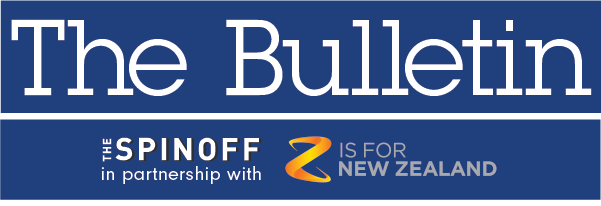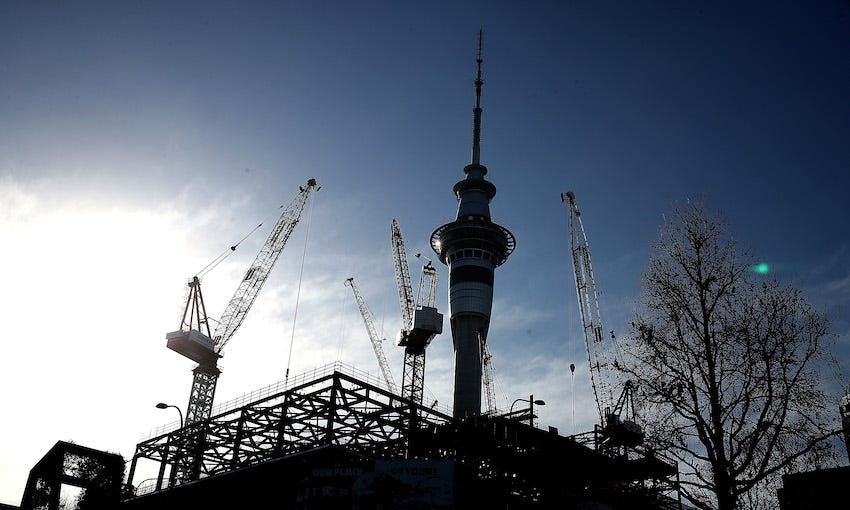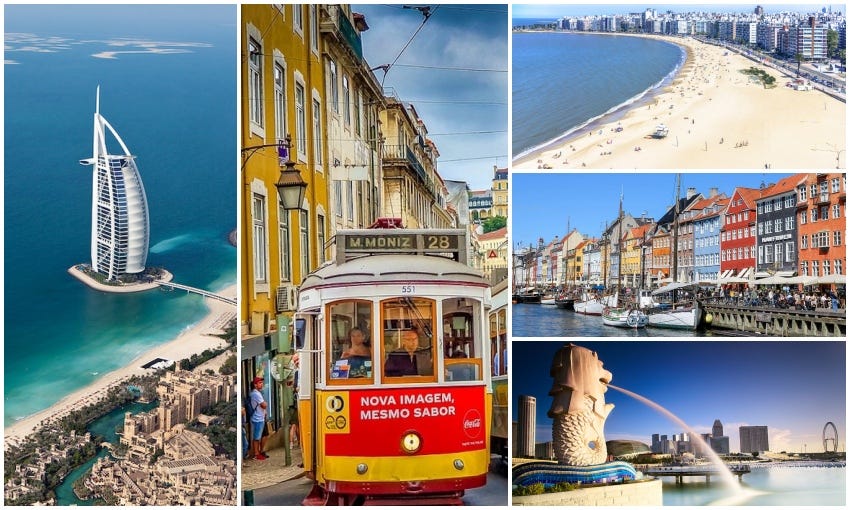Stories you may have missed during lockdown
As much of the country moves to level three, a look at some big issues that will continue to hold our attention for the rest of the year.
Good morning and welcome to The Bulletin for Wednesday, September 1, by Justin Giovannetti. Presented in partnership with Z Energy
In today’s edition: The government’s emissions plan is coming soon, worker shortages are being reported across the country and proposed hate speech legislation could need some tweaks.
A special thanks to Auckland for doing the hard work, again. (Fiona Goodall, Getty Images)
A slow recovery starts. With much of the country now down to alert level three and parliament resuming, there are small hints of an eventual return to normalcy. The delta outbreak will continue to dominate the country’s agenda for weeks to come, but the wheels of government and society are slowly getting back into motion.
A very different parliament. There was very little normal about parliament yesterday, with fewer than a dozen people in a socially distanced chamber that usually sits 120 MPs. There are no tour groups and very few staff outside the Beehive, where the prime minister’s office continues to operate. Labour, National and Act were back in the house, while the Greens will return today. The Māori party have refused to participate during lockdown. Politik (paywalled) has captured the brinkmanship that led to parliament’s in-person return rather than a virtual reunion.
Act leader David Seymour, long seen as a party of one before the last election, has now lived up to the description. He was at parliament alone, without any other MPs or support staff. If you missed the proceedings, this video by The Spinoff is a close approximation. It could also serve as a trailer for a parliamentary apocalypse.
The government and opposition settled into a question time that largely focused on the Covid-19 response, the vaccination programme and the chaotic evacuation from Afghanistan. The debate was detailed in The Spinoff’s live updates, however the highlight in my mind was a lengthy exchange between Covid-19 minister Chris Hipkins and National spokesperson Chris Bishop. It was informative and I came away wiser, which is not something I can usually say after watching parliament TV.
Beyond the outbreak. Today, The Bulletin will look at some issues that might have been overlooked during the past two weeks of disruptions and will remain with us:
The clock is ticking on climate change. The government has until the end of the year to unveil concrete plans to tackle climate change. The country’s emissions have gone up year after year when they need to be going down rapidly to meet a short-term target in 2030. According to Farmers Weekly, climate change minister James Shaw told business leaders that a plan is coming next month. If it’s a credible plan it could be one of the most important documents created by Jacinda Ardern’s government.
However, the government’s actions to date don’t suggest its focus is on the climate crisis declared by parliament. Purchasing new ferries for the Interislander, KiwiRail chose not to select the lowest-emissions models it could get. The Dominion Post reports the massive ships will be delivered within five years and could operate for decades, but KiwiRail rejected an option to power them with methanol. While they’ll have lower emissions than the current ships, they’ll still run partly on marine diesel, which seems to be out of step with the way the global shipping industry is moving.
The border remains closed. The managed isolation system remains the country’s first line of defence against Covid-19, however after 18 months it has caused worker shortages across the economy. The ripples will continue for some time. While much attention has been paid to seasonal labour in the horticultural industry, the Timaru Herald profiles a farmer who is putting in 100 hours a week to keep his dairy and deer operations running. His relief used to come from France and Germany, but that’s not happening anymore.
Don’t think this is limited to agriculture. Medical specialists are finding immigration nearly impossible, describing the system as “shambolic". RNZ reports that hundreds of doctors and nurses who applied to come to New Zealand have had no response since last March when the government put a freeze on skilled migrant residence visas. Attempts by medical associations to get the immigration process going have been met with silence. Nearly 40% of the country’s medical field comes from overseas.
The government cut off emergency benefits for migrants yesterday. The ministry of social development took over a Red Cross scheme last year for temporary visa holders who face hard times or can't work enough to survive. For example, an estimated 25,000 international students are legally barred from working more than 20 hours a week. But as RNZ reports, the ministry has stopped the programme and told migrants to contact their embassies for help or go home, which would mean abandoning their studies.
MIQ is still broken. New bookings in managed isolation are currently on hold as all new space is being set aside for the delta cluster. In a sign of how difficult it has become to secure spaces in MIQ, even aided by technology, One News reports a government agency has hired three students whose only job is to refresh the booking page. They are trying to secure spots for overseas government employees who want to come home for a visit.
Hate speech legislation is open for debate. The Human Rights Commission has concerns over a proposed hate speech law. Chief commissioner Paul Hunt told RNZ's Morning Report yesterday that while the legislation is "overdue", political opinion should not be included. He warned that the country's democracy could take a hit from including political opinion within the legislation, and that it could chill debate.
A second evacuation from Afghanistan is possible. For the first time in two decades there are no American troops in Afghanistan. New Zealand’s evacuation of citizens, residents and allies ended after three flights as the security situation at Kabul airport disintegrated. A number were unable to get out, but it’s unclear just many. Cabinet is now considering a “second phase” to the response, according to Stuff. That could include resettling refugees from the country. If you’re wondering what’s happening in Afghanistan now that western troops have left, Reuters has a good explainer.
As lockdown continues, The Spinoff is doing our utmost to keep you updated on Covid-19 related news through this outbreak. Every dollar our members contribute directly funds our editorial team and is devoted to ensuring we do more. Click here to learn how you can support the team today.
The Covid numbers: There were 49 new community cases reported yesterday, all in Auckland. That's the lowest number in six days and a good sign that the lockdown is working. Over 75,000 vaccines were administered, not a record, but very high. Vaccinations are also now open to everyone in the country over the age of 12. If you’ve woken up in level three, here’s a reminder of the rules.
If you’ve got plans to celebrate level three, within the rules of course, The Bulletin would love to hear them thebulletin@thespinoff.co.nz.
Auckland’s wild weather explained. Up to 260mm of rain was recorded on west Auckland yesterday in the second wettest day since NIWA began keeping records. According to the NZ Herald, the agency said a rare "low level jet" stalled over the city, dropping rain on Auckland in a ferocious downpour that lifted dam levels by 7% in a few hours. Which is impressive. These kinds of unusual weather patterns are expected to become more common as the climate warms.
A quick update on yesterday’s vaccine story. While New Zealand has yet to unveil its plan to acquire more doses of the Covid-19 vaccine, Australia has. Prime minister Scott Morrison announced that he has closed a deal to get 500,000 doses from Singapore that are going to expire soon. The vaccines will be in Australian arms next week, ABC reports. Singapore will get half a million doses from Australia in December. While it means those doses are off the market for New Zealand's aspirations, it’s a sign of the swaps that are possible and underway between countries.
Got some feedback about The Bulletin, or anything in the news?
Get in touch with me at thebulletin@thespinoff.co.nz
A postcard of the post-vaccine world (Clockwise: Sacha Fernandez CC BY-NC-ND 2.0, Sam Valadi CC BY 2.0, Getty Images, Creative Commons)
Right now on The Spinoff: George Driver looks at what life is like in the world’s most vaccinated countries. Duncan Greive writes that dividing Aotearoa by alert levels will have a sizeable impact on the country. Anjum Rahman reviews Patrick Gower’s documentary about the mosque shooting and finds he put his focus where it should be. Melani Anae opines that health staff telling Pacific peoples “no passport, no jab” wasn’t confusion, but racism. Chris Schulz, in the read many of us need, reports on how to improve our lockdown coffee game.
For a feature today, New Zealand’s new base in Antarctica. When the government’s budget was tabled earlier this year, money set aside for a new Scott base leapt off the page. The $344 million allocated to the base was huge in a budget that didn’t really splash the cash around. As an example that I still remember, that’s more than was allocated for the entire Māori housing budget. The Detail has taken a look at the base and even the Antarctica experts are a little astonished at the price. They’re also worried that more money for building will mean less for research:
Polar expert Dr Alan Hemmings, from the University of Canterbury, has 40 years' Antarctic experience.
“My initial response is that it’s profligate,” he says.
“Although the narrative that’s been spun by station proponents that it’s archaic ... and we need this rinky-dink base … in fact Scott Base has been updated like pretty much every other Antarctic station reasonably regularly over its lifetime. The Hillary Field Centre was only completed five to six years ago.”
The details on Super Rugby Pacific. The 12-team version of super rugby starting next year moves beyond South Africa and Argentina, as the Pacific competition welcomes Moana Pasifika in Auckland and the Fijian Drua, likely in Australia. The whole thing rests on the trans-Tasman bubble reopening in February, according to the NZ Herald (paywalled). After weeks of stories about how bad rugby relations have gotten between New Zealand and Australia, the competition is a testament to compromise and just getting on with it.
That's it for The Bulletin. If you want to support the work we do at The Spinoff, please check out our membership programme.







